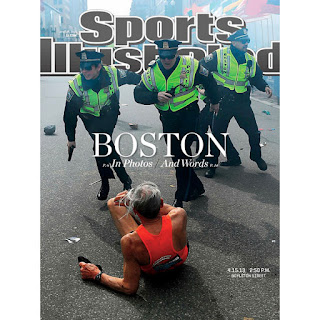
Since the bombing on April 15, 2013 of the annual Boston Marathon, the community of Boston, Massachusetts has made emotional waves throughout American society by the force of their people’s perseverance through pronounced tragedy. Indeed, the exemplary behavior of Bostonians in the wake of the terror attack has caused other Americans to submerge themselves in some soul-searching of their own.
Turning the other cheek is as much a part of the Christian heritage as any other requisite of the religion is. Jesus Christ, in spite of all the brutality and persecution that was doled out to his person, never met his adversaries at their baser level. But turning the other cheek has also got to be the hardest thing to ask of anyone who has just been stricken by an antagonist. Bostonians had every reason, every justification to be vengeful to the individuals who shocked them with their violent actions.
Alas, there are few major cities in the world as Christian in style and substance as Boston is and this was reflected in what was essentially their turning the other cheek by not hitting the streets carrying pitchforks and crying out for the lynching of the Tsarnaev brothers. Bostonians took the harm done to their fellow citizens with all the composure that could be expected of anyone under such circumstances.
How much more is there to say about the people of Boston and about the atrocity they have been forced to endure? With many facts yet to be uncovered, I gather that what has already been said is only the tip of the iceberg. One of the bits and pieces of the iceberg that continuously flashes in my mind is the scene of the Tsarnaev brothers’ uncle in Maryland standing in front of a gaggle of reporters unequivocally distancing himself and his family from his nephews’ crimes. What struck me as much as anything else the uncle said was his appeal to his nephew to ask for forgiveness from those that were maimed and killed.
I am sure that there are those struggling to understand why the Tsarnaev brothers carried out such a terrible deed against Americans especially after they lived among them and after having immersed themselves in American society and culture. I think though, just as important in understanding why the brothers did what they did, we should allow ourselves a cognitive chance at the bombing’s emotional and punitive postmortem, at whether or not Tamerlan and Dzhokhar Tsarnaev deserve forgiveness as their uncle suggested for the younger one.
In the teenaged Dzhokhar’s case---since his older brother Tamerlan is no longer able to answer for his crimes---the path of forgiveness seems far-fetched. However, there is a small minority out there that would carve out such a path for him. Leaning heavily on his critical consideration of religious apologetics for example, television atheist/talk show host Bill Maher laments that Christians tend to naively forgive wayward American politicians no matter what the sin. So what’s to stop indoctrinated Christians from invoking their religious beliefs and expressing the hope that the surviving Tsarnaev brother can be forgiven as God would want supposedly?
Being the delicate matter that it is, is it fair to the victims of the Boston Marathon bombing that Dzhokar be forgiven? Should he not be dispatched to whatever lies beyond for not curbing his murderous stimuli and cutting down innocents? Or should we do what Christians would want us to do? That is to roll the dice of justice by saving Dzhokar from the death penalty and let God judge him in the afterlife after serving a life sentence. This, at the heart of it, is a form of forgiving what cannot be forgiven.
I’ve heard the old liberal argument, that the death penalty doesn’t deter murderous acts, that it doesn’t solve anything, that it is cruel and unusual punishment. It is worth pointing out that deterrence is ephemeral anyhow and that the threat of the lethal injection will not stop murders now or in the future. It should be highlighted for Christians and any other like-minded bleeding hearts that the death penalty doesn’t deter crime---it delivers justice. So if you doubt that Dzhokar Tsarnaev doesn’t deserve death, I suggest you ask his victims and see what they have to say about it. Or ask yourself, “How would I feel if my loved one was one of the victims?”
ALLEN GABORRO
Comments
Post a Comment